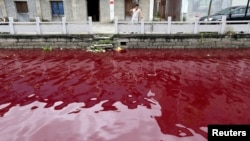Red is a lucky color in Chinese culture, but not when it comes to river water.
The red water was discovered last month in the Chinese city of Wenzhou. Some people there also reported a strong, sharp chemical smell in the air.
The local environmental protection agency investigated the incident. Officials said they found no sign of pollutants released from the factories that line the river.
Wu Yixiu follows water pollution issues for the environmental group Greenpeace. She says this red river incident shows how environmental problems are increasingly affecting people in cities.
“I think the water pollution problem … it’s no longer a remote problem, only in the countryside. It’s affecting everyone, even people in the cities.”
Wenzhou is a center for business and industry on China’s eastern coast. It is also home to many Chinese Christians and has been called China’s Jerusalem. After the river water turned red some city residents posted messages on social media. Their messages said the red waters were a sign of Armageddon - an event described in Christianity’s holy book as marking the end of the world.
Environmentalist Ma Jun says the river pollution is not the sign of the end of times. But he says it does represent an important time in China’s fight against pollution.
“So I think the next 20 years will be quite critical. The government needs to make efforts to reduce pollution to provide a safe and healthy environment for this generation.”
How many dead pigs can fit in a Shanghai river?
The Wenzhou River turning red is the latest of several environmental incidents in China. In 2012, the Yangtze River also turned red because of illegal pollution from a factory. Last year, more than 2,000 dead pigs were found floating through a river in Shanghai.
In addition, China’s government has identified several hundred of what have been called “cancer villages.” These are areas where the rates of cancer are unusually high because of industrial pollution.
Ma Jun says there are more than 1,700 water pollution incidents in China every year. He says many of China’s rivers, lakes and even aquifers are polluted. An “aquifer” is a layer of rock or sand that can hold water.
“China is facing a serious water pollution challenge. Much of our rivers, lakes and even our aquifers have been contaminated especially in the densely populated regions. This has posed a serious risk. Up to 300 million residents don’t have access to safe drinking water.”
Earlier this year Chinese Premier Li Keqiang threatened to launch a war on pollution. Environmental activists say that war will depend on enforcement of existing Chinese laws. Residents of Wenzhou would most likely welcome such an offensive. Eighty percent of the water off of Wenzhou’s coast is considered polluted.
I’m Anna Matteo.
VOA Beijing correspondent Shannon Van Sant wrote this report and Anna Matteo adapted it into Special English.
________________________________________________________________
Words in the News
culture – n. all the beliefs, traditions and arts of a group or population
pollute – v. to release dangerous or unpleasant substances into the air, soil or water (Pollutant and pollution are noun forms of the verb "to pollute.")
incident – n. an event or something that happens
industry – n. any business that produces goods or provides services; the work and related activity in factories and offices; all organizations involved in manufacturing
Armageddon - n. the site or time of a final and conclusive battle between the forces of good and evil
Now it’s your turn to use these words in the news. In the comment section, write a sentence using one of these words and we will provide feedback on the use of vocabulary and grammar.







